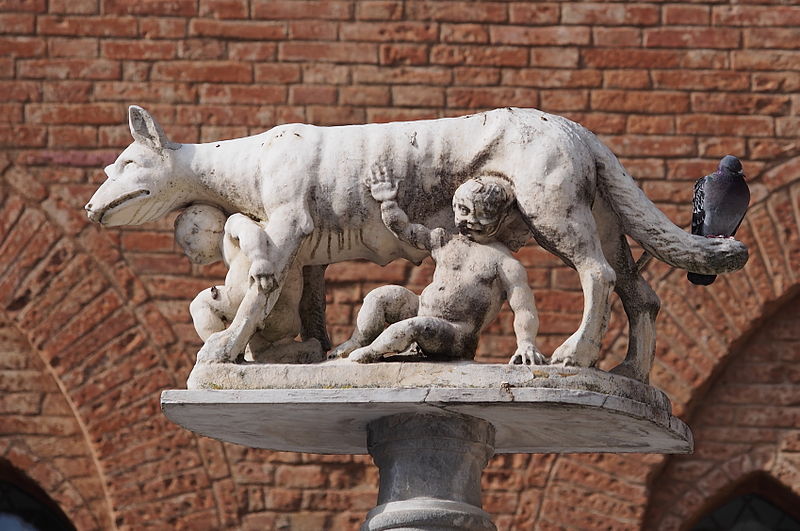Kids learning zone
Timeline
According to legend Rome was founded by Romulus, he was the first king after killing his brother Remus in an argument. They were supposedly suckled by a she wolf after been abandoned on the banks of the River Tiber when they were babies.
It is so old, it is today known as 'the eternal city'. The Romans believed that their city was founded in the year 753 BC. Modern historians though believe it was the year 625 BC. The land was occupied by tribes like the Etruscans and Sabines who were later conquered.
Early Rome was governed by kings, but after only seven of them had ruled, the Romans took power over their own city and ruled themselves.
They then instead had a council known as the 'senate' which ruled over them. From this point forward we speak of the 'Roman Republic'.
The word 'Republic' itself comes from the Latin (the language of the Romans) words 'res publica' which means 'public matters' or 'matters of state'.
Romulus and Remus with the she wolf statue showing the origins of Rome
Below you can see some of the major events in it's history with the things that affected 'Britannia' Britain and 'Caledonia' Scotland highlighted in BOLD text
The history is vast & very complex but for you to understand the Romans in this country you must be able to understand them in their own & other countries. The history continues to this day but I have stopped when the Romans left Britain.
In 284 AD Diocletian set up the 'Tetrarchy' dividing the empire into east and west each with it's own emperor, Diocletian assisted by Galerius ruled the east and Maximus ruled the west reorganising coinage, tax, and the military. He also was responsible for the most fierce persecution of Christians. In 330 AD Constantine moved the imperial capital from Rome to Constantinople ruling a divided empire, by 476 the empire as we know it ends in the west but continues successfully using the same laws and culture of Rome in the east until 1453.
There were 3 main periods of ancient Rome
509 - 27 BC The Republic of Rome
27 BC - 476 Imperial Rome
753 BC: Roma (Rome) is founded by Romulus after killing his twin Remus
600 BC: The Forum is built
550 BC: Servius Tullius builds city walls
509 BC: The last king is expelled and Roma becomes a republic
387 BC: The Gauls/Celts sack Roma
326 BC: The Circus Maximus is built
312 BC: The Via Appia is opened the main road from Rome
308 BC: Roma conquers the Etruscan city of Tarquinia
295 BC: Roma defeats the Gauls/Celts in northern Italy
280 BC: Roma issues coins
275 BC: Roma conquers southern Italy (Greek colonies)
264 BC: The Romans destroy the last vestiges of the Etruscan civilization (Volsinies)
222 BC: The Gauls are defeated
218 BC: Hannibal invades Italy
149 BC: Roma destroys Carthage
133 BC: Attalus III of Pergamum wills his kingdom to Roma and the whole Mediterranean Sea is under Roman control ("mare nostrum")
88 BC: Italians are granted full citizenship
73 BC: Spartacus leads the revolt of the gladiators
71 BC: Crassus puts down Spartacus' revolt
59 BC: Caesar is elected consul
57 BC: Caesar conquers all of Gaul
55 BC: Caesar first visits Britannia
54 BC: Caesar second visit to Britannia
51 BC: Caesar crushes revolt of Vercingetorix in Gaul
50 BC: Roma introduces the gold coin "aureus"
49 BC: Caesar crosses the Rubicon, defeats Pompey and becomes sole dictator of Rome, calling himself "imperator"
47 BC: Caesar invades Egypt and proclaims Cleopatra queen
45 BC: Julius Caesar employs the Egyptian astronomer Sosigenes to work out a new 12-month calendar (Julian calendar)
44 BC: Caesar is killed.
30 BC: Cleopatra commits suicide and Egypt is annexed to Roma
6 BC: Jesus is born in Palestine
1 AD: Roma has about one million people
5 AD: Roma acknowledges Cymbeline, King of the Catuvellauni, as king of Britain
14 AD: five million people live in the Roman Empire
43 AD: Claudius invades Britain
50 AD: The Romans found Londinium (London) in Britain
60-61 AD: Boudica revolts with the Iceni tribe against the Romans
77-78 AD: the Romans conquer Wales
79 AD: The Vesuvius erupts and Pompeii is buried under ash
79 AD: The Colosseum is completed
80 AD: The Romans invade Caledonia (Scotland)
84 AD: Agricola campaigns in Scotland & scores victory at the battle of Mons Graupius
86 AD: Romans withdraw from Scotland north of the Forth
95-105 AD: Romans withdraw from Scotland to northern England
97 AD: Roma forbids human sacrifice throughout the Roman Empire
100: The city of Roma has one million inhabitants
122: Hadrian's Wall is built along the northern frontier to protect from the Barbarians
140: Antoninus Pius orders the building of the Antonine wall in Scotland
164: The plague spreads throughout the Roman Empire
180: Britain divided into to provinces with London (Londinium) as the southern capital & York (Eboracum) as the Northern capital
208: Septimius Severus campaigns in Scotland re-occupying some of the Agricolan forts & Antonine wall
212: Caracalla grants Roman citizenship on all free people who live in the Roman Empire
300: The population of the Roman Empire is 60 million (about 15 million Christians)
303: Diocletian orders a general persecution of the Christians
313: Constantine ends the persecution of the Christians (edict of Milano)
313: Constantine recognizes the Christian church
330: Constantine I builds a new city, Constantinople (Byzantium)
356: Roma has 28 libraries, 10 basilicas, 11 public baths, two amphitheaters, three theaters, two circuses, 19 aqueducts, 11 squares, 1,352 fountains, 46,602 insulae (city blocks)
359: Constantinople becomes the capital of the Roman Empire
406: Barbarians invade France from the north
410: The Visigoths sack Roma
410: Romans withdraw from Britannia to defend Rome & the Dark ages begin for Britannia
